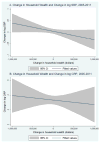The physiological impacts of wealth shocks in late life: Evidence from the Great Recession
- PMID: 26773705
- PMCID: PMC4764349
- DOI: 10.1016/j.socscimed.2015.12.029
The physiological impacts of wealth shocks in late life: Evidence from the Great Recession
Abstract
Given documented links between individual socioeconomic status (SES) and health, it is likely that-in addition to its impacts on individuals' wallets and bank accounts-the Great Recession also took a toll on individuals' disease and mortality risk. Exploiting a quasi-natural experiment design, this study utilizes nationally representative, longitudinal data from the National Social Life, Health, and Aging Project (NSHAP) (2005-2011) (N = 930) and individual fixed effects models to examine how household-level wealth shocks experienced during the Great Recession relate to changes in biophysiological functioning in older adults. Results indicate that wealth shocks significantly predicted changes in physiological functioning, such that losses in net worth from the pre-to the post-Recession period were associated with increases in systolic blood pressure and C-reactive protein over the six year period. Further, while the association between wealth shocks and changes in blood pressure was unattenuated with the inclusion of other indicators of SES, psychosocial well-being, and health behaviors in analytic models, we document some evidence of mediation in the association between changes in wealth and changes in C-reactive protein, which suggests specificity in the social and biophysiological mechanisms relating wealth shocks and health at older ages. Linking macro-level conditions, meso-level household environments, and micro-level biological processes, this study provides new insights into the mechanisms through which economic inequality contributes to disease and mortality risk in late life.
Keywords: Blood pressure; Inflammation; Longitudinal analysis; The Great Recession; Wealth.
Copyright © 2015 Elsevier Ltd. All rights reserved.
Figures
References
-
- Ackerman, Robert A, Fries Gerhard, Windle Richard A. Changes in US Family Finances from 2007 to 2010: Evidence from the Survey of Consumer Finances. Federal Reserve Bulletin. 2012;100:1–80.
-
- Alley DE, Soldo BJ, Pagan JA, McCabe J, DeBlois M, Field SH, Asch DA, Cannuscio C. Material Resources and Population Health: Disadvantages in Health Care, Housing, and Food among Adults Over 50 Years of Age. American Journal of Public Health. 2009;99(Suppl 3):S693–701. doi: 10.2105/AJPH.2009.161877. - DOI - PMC - PubMed
-
- Allison Paul D. Change Scores as Dependent Variables in Regression Analysis. Sociological Methodology. 1990;20(1):93–114.
-
- Black Paul H, Garbutt Lisa D. Stress, Inflammation and Cardiovascular Disease. Journal of Psychosomatic Research. 2002;52(1):1–23. - PubMed
-
- Black Sandra E, Devereux Paul J, Salvanes Kjell G. Losing Heart? the Effect of Job Displacement on Health. 2012 NBER Working Paper No 18660.
MeSH terms
Substances
Grants and funding
LinkOut - more resources
Full Text Sources
Other Literature Sources
Research Materials


